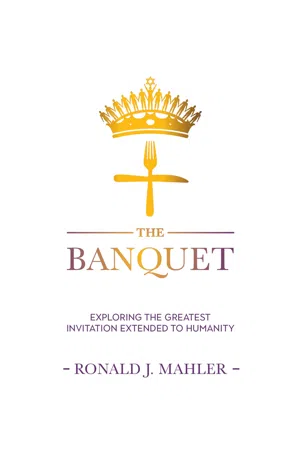![]()
_________ Chapter _________
one
An RSVP Worth Responding To
(Luke 14:15–24)
One of my all-time favourite movies is the 1968 flick The Party. It starred one of the funniest men the movie industry has ever known: Peter Sellers. The comedic genius of the late actor was his innate ability to get his audience to believe in the absolute absurdity of his characters. Those familiar with Sellers’s insufferable character in the Pink Panther series of movies are aware of how his acting brilliance could shed a hysterical light on any given situation—even when it wasn’t warranted!
In The Party, Sellers played a man named Hrundi V. Bakshi, an aspiring actor who does nothing but destroy every movie set he ever steps foot on. After Bakshi mistakenly receives an invitation to an upscale party in the Hollywood Hills, he sheepishly shows up at the event and, true to his invariably klutzy form, proceeds to make the same disastrous mess of the host’s home that has made him the stimulus of many a movie director’s vexation. If you’ve seen the movie you know that near its end the home is turned into a giant pool of suds and bubbles—which not only dampens the mood of the prestigious event but hastens its merciful end.
Invitations
Unlike the unfortunate (or perhaps fortunate) Hrundi V. Bakshi, it’s great to be intentionally invited to an event. In fact, one of the finer joys in life is receiving an invitation for a party, wedding, or some other social function. Receiving an invitation to a particular event sometimes depends on who we are. Glamorous parties, socials, and banquets are often exhibitions of the who’s who of society and popular culture. Celebrities, for instance, are often put on VIP lists for private parties; their name and fame precede them. When it comes to scoring an invite to highfalutin events, their position, power, and pedigree can certainly work in their favour.
At other times, it’s all about who we know. I remember attending a distinguished fundraising event some years ago and getting to meet a popular professional hockey player from the Toronto Maple Leafs. Because I knew the right people, I was able to rub shoulders with celebrities and other known personalities I would normally never dream of being in the same room with. There were many in the first century who got to enjoy that very privilege with none other than God-incarnate Himself!
Feasts and Banquets in Jesus’s Day
Feasts and banquets were big deals to people in the ancient Near East and included much ritual, pomp, food, and wine. Guests were usually welcomed by the host with a kiss, and their feet and hands were washed by servants due to the dusty terrain they travelled to reach their destination. Sometimes a guest’s head, feet, beard, and clothes were anointed with oil before the event began. The most honoured guests received larger portions of food or more choice ones than the other guests. Often the feasts and banquets were enlivened by entertainment that featured singing, different forms of music, dance, and even riddles. A banquet of great size was known to last as long as a week or more.
Banquets and elaborate fetes in our Lord’s day were usually held in honour of notable persons or as a means of celebrating certain events. Anything from ordinary meals to birthday celebrations to wedding feasts, funerals, and elaborate banquets were among the most important settings in which shame and honour within society were magnified.
The religious feasts prescribed in the Mosaic Law in the Old Testament were a significant part of the social fabric of Israel. Such feasts, in Jesus’s day, irrespective of their focus, could reflect where one stood within society’s pecking order. The who’s who of Israel could not only be spotted at such events but be found occupying the best seats! If you were an esteemed individual this meant you were assured a seat of honour at the table by the host. Conversely, if you were deemed a scoundrel, were untrustworthy, or were of some bearably tolerable ilk, you were assigned a less desirable seat at the table. Worse still, if you were considered somewhat of an outcast or were an unclean person, the bleacher seats were always an option—which meant you had to sit alone somewhere within the periphery of the other guests. If you were never invited to a party, well … you basically didn’t matter very much. Such public gatherings highlighted the neediness of the physically and socially challenged among them. These persons were tolerated, not celebrated.
It was a society of profound social distinction. Guests at banquets were seated according to their respective rank. Therefore, each position at the table had a value assigned to it, making the feast-setting an opportune place to advance one’s status. Such was the sociocultural backdrop draped behind the stage Jesus set for the actors in His kingdom-invitation drama, the parable of the great banquet in Luke 14.
For the audience of Luke’s Gospel, the communal meal was connected to worship. Believers participated in a feast that surrounded the early church’s observance of the Eucharist (the Lord’s Supper). In the parable of the great banquet, Jesus links the believer’s worshipful entrance into God’s presence and the heavenly eternal state with a celebratory feast. The parable repeats and expands the theme of hospitality Jesus stresses to the Pharisee whose feast He is attending. The Saviour points out that not only are some at the feast amateurishly jockeying for the most distinguished seats in the house but, also, people who should’ve been invited were not. The Lord proceeds to teach that those who should be the first to go into the messianic feast in the last day are excusing themselves from it, making room for other more marginal folks, people whom most Jews gasped at the thought of God allowing into His kingdom, and ahead of many of them!
Jesus has a lot to say through the parable of the great banquet for everyone who either knows Him as Lord, rejects Him as such, or sees Him as an inferior religious figure in history. Despite the dichotomous issues that exist between Jews and Christians culturally and theologically, people of both faiths rightfully anticipate a future heavenly banquet to commence with their places secured in it. The question, then, is not whether there will be a banquet but who among those two groups will actually make it in. Then there’s the matter that those who have not heard abo...

